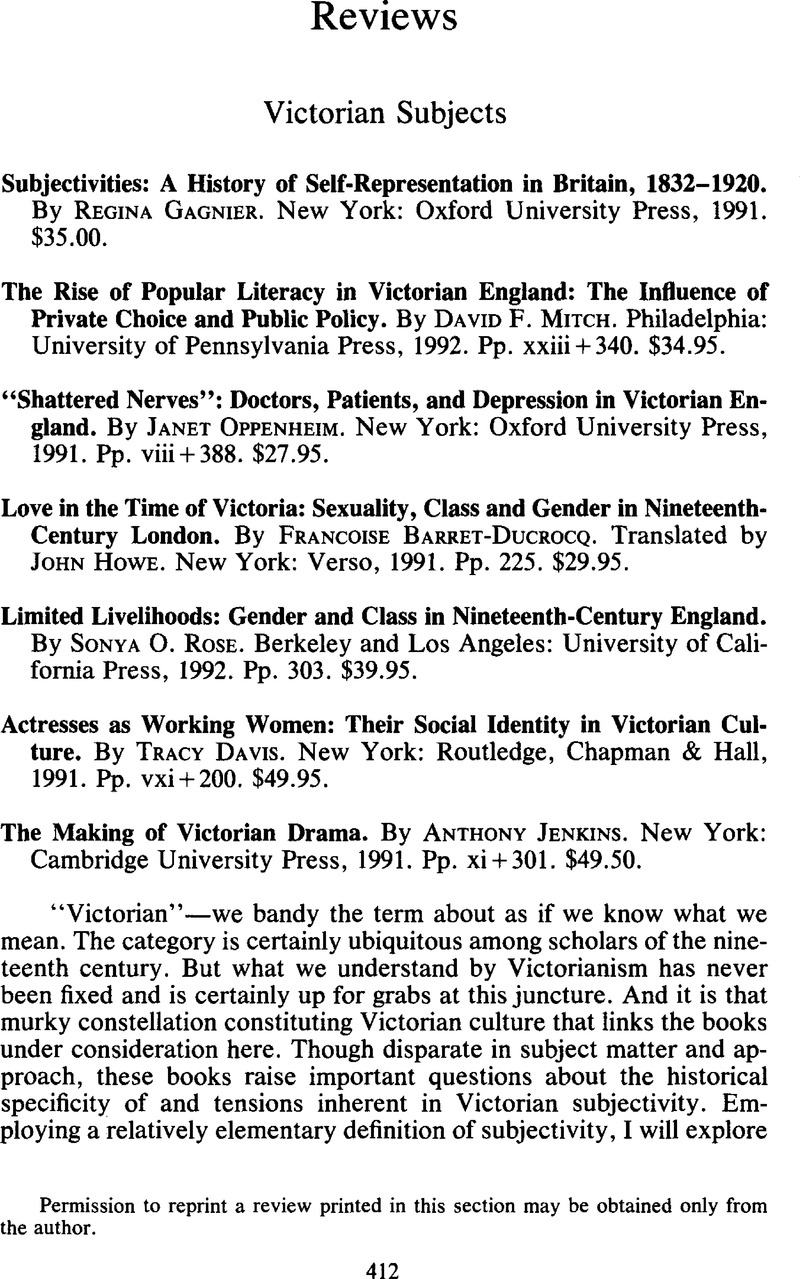No CrossRef data available.
Article contents
Victorian Subjects - Subjectivities: A History of Self-Representation in Britain, 1832–1920. By Regina Gagnier. New York: Oxford University Press, 1991. $35.00. - The Rise of Popular Literacy in Victorian England: The Influence of Private Choice and Public Policy. By David F. Mitch. Philadelphia: University of Pennsylvania Press, 1992. Pp. xxiii + 340. $34.95. - “Shattered Nerves”: Doctors, Patients, and Depression in Victorian England. By Janet Oppenheim. New York: Oxford University Press, 1991. Pp. viii + 388. $27.95. - Love in the Time of Victoria: Sexuality, Class and Gender in Nineteenth-Century London. By Francoise Barret-Ducrocq. Translated by John Howe. New York: Verso, 1991. Pp. 225. $29.95. - Limited Livelihoods: Gender and Class in Nineteenth-Century England. By Sonya O. Rose. Berkeley and Los Angeles: University of California Press, 1992. Pp. 303. $39.95. - Actresses as Working Women: Their Social Identity in Victorian Culture. By Tracy Davis. New York: Routledge, Chapman & Hall, 1991. Pp. vxi + 200. $49.95. - The Making of Victorian Drama. By Anthony Jenkins. New York: Cambridge University Press, 1991. Pp. xi + 301. $49.50.
Published online by Cambridge University Press: 10 January 2014
Abstract

- Type
- Reviews
- Information
- Copyright
- Copyright © North American Conference of British Studies 1995
References
1 There is a considerable literature on subjectivity—both psychoanalytical and literary/cultural. I am not attempting to intervene in theoretical discussions on this area. Instead, I am using the term to signify “human lived experience and the physical, political and historical context of that experience.” See Ellis, Carolyn and Flaherty, Michael G., “An Agenda for the Interpretation of Lived Experience,” in Investigating Subjectivity, ed. Ellis, Carolyn and Flaherty, Michael G. (Newbury Park, Calif.: Sage, 1992), p. 1Google Scholar.
2 Strachey, Lytton, Eminent Victorians (1818; reprint, Harmondsworth: Penguin, 1988)Google Scholar. In Poverty and Compassion: The Moral Imagination of the Late Victorians (New York: Knopf, 1991)Google Scholar, Gertrude Himmelfarb (p. 7) argues for the “Victorian obsession with morality” and the “irrefutable” evidence that “morality played a significant role in social affairs.” Many other standard works on the Victorian period rely greatly on interpretations stressing morality, values, and the importance of character attributes. See, among others, Young, G. M., Victorian England: Portrait of an Age (Garden City, N.Y.: Doubleday Anchor, 1954)Google Scholar; Houghton, Walter E., The Victorian Frame of Mind, 1830–1870 (New Haven, Conn.: Yale University Press, 1957)Google Scholar; Burn, W. L., The Age of Equipoise: A Study of the Mid-Victorian Generation (New York: Norton, 1964)Google Scholar; Marcus, Steve, The Other Victorians: A Study of Sexuality and Pornography in Mid-Nineteenth-Century England (New York: Basic, 1964)Google Scholar; Clark, G. Kitson, The Making of Victorian England (New York: Atheneum, 1976)Google Scholar; Weiner, Martin J., English Culture and the Decline of the Industrial Spirit, 1850–1980 (Harmondsworth: Penguin, 1985)Google Scholar; Walvin, James, Victorian Values (London: Andre Deutsch, 1987)Google Scholar; Marsden, Gordon, ed., Victorian Values: Personalities and Perspectives in Nineteenth-Century Society (London: Longman, 1990)Google Scholar.
3 See Scott, Joan W., “Experience,” in Feminists Theorize the Political, ed. Butler, Judith and Scott, Joan W. (New York: Routledge, 1992), pp. 22–40Google Scholar, for a sensitive discussion of these issues.
4 Acorn, George [pseud.], One of the Multitude (London: William Heinemann, 1911)Google Scholar.
5 Though more could have been done with the historical context, Mitch is impressive in his familiarity with the historical literature on literacy, education, work, and leisure.
6 See Auerbach, Nina, Ellen Terry: Player in Her Time (New York: Norton, 1987)Google Scholar; Tickner, Lisa, The Spectacle of Women: Imagery of the Suffrage Campaign, 1907–14 (Chicago: University of Chicago Press, 1988)Google Scholar; and Stowell, Sheila, A Stage of Their Own: Feminist Playwrights of the Suffrage Era (Ann Arbor: University of Michigan Press, 1992)CrossRefGoogle Scholar.
7 Evidence for this would be the rise of serious criticism, the fascination with Ibsen, and Shaw's role as general cultural observer—topics that are all briefly covered in Jenkins.




